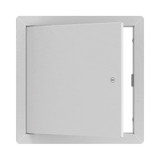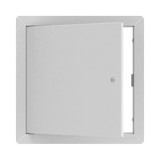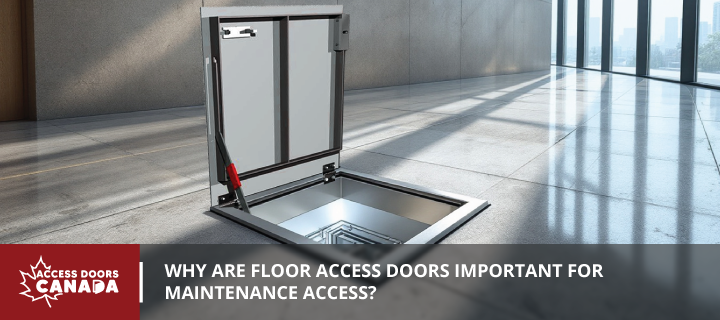Why Are Floor Access Doors Important for Maintenance Access?
Floor access doors provide crucial access to hidden components, ensuring efficient building operation and longevity. These panels offer access to hidden components, essential for maintaining a structure's efficiency.
Think of a building as a living organism. Its internal systems—plumbing, electrical, and HVAC—are vital organs. Just as humans need regular check-ups, buildings need routine maintenance. This is where floor access doors shine. They are gateways to these critical systems, allowing for easy inspection, repair, and replacement.
Benefits of Floor Access Doors
- Cost Savings: According to an academic study on a comprehensive approach for maintenance performance measurement, buildings with accessible maintenance points can reduce maintenance costs by 15-20%. Early detection and repair of minor issues through access doors prevent them from escalating into expensive problems.
- Enhanced Efficiency: Floor access doors streamline maintenance tasks by reducing the required time. Crews save time breaking down walls or floors to reach hidden systems, translating to faster repairs, less disruption to building occupants, and increased tenant satisfaction.
- Enhanced Building Lifespan: Through proactive maintenance, floor access doors play a key role in ensuring a building's health and longevity. Easy access to critical systems allows for regular inspections, cleaning, and adjustments, preventing premature wear and tear.
Other Applications of Floor Access Doors
Floor access doors are versatile products with applications beyond standard maintenance access. Let us explore some specialized use cases:
- Healthcare facilities demand specialized floor access doors that meet stringent requirements. These doors need to be easily sanitized, non-combustible, and secure. Additionally, compliance with ADA regulations is essential to ensure easy access for patients, staff, and maintenance personnel.
- Commercial kitchens need specialized floor access doors to endure heavy foot traffic, moisture, and equipment impacts. Doors must be cleaned and sanitized to maintain food safety standards. Slip-resistant surfaces are essential to prevent accidents, and fire-rated doors are necessary in areas with high fire risk.
- Industrial settings demand robust floor access doors that withstand heavy equipment, harsh conditions, and chemical exposure. These doors must support heavy weight while incorporating safety features like emergency release mechanisms and non-slip surfaces.
By addressing the unique challenges of these sectors, floor access doors become more valuable.
Environmental Benefits
Beyond cost savings and efficiency, floor access doors contribute to sustainability. Easy access to building systems eases timely repairs, reducing the need for complete replacements. This minimizes waste and conserves resources. Additionally, efficient maintenance often improves energy performance, reducing a building's environmental impact.
Accessibility Considerations
Ensuring accessibility for maintenance personnel is crucial. Floor access doors should be designed and installed to accommodate individuals with disabilities. This includes providing adequate clearance, clear labeling, and considering the doors' weight capacity. Specific features to consider include:
- Lever-style handles instead of knobs.
- Clear and contrasting color schemes for labels and handles.
- Adequate space around the access door for wheelchair maneuverability.
- Automatic or power-assisted door openers for heavy doors.
Fire Ratings
Besides their maintenance benefits, floor access doors are crucial in emergencies. Doors with appropriate fire ratings can help slow the spread of fire and smoke for a limited time and ease the evacuation process. Choosing doors with the correct fire rating for your building is essential for occupant welfare and structural integrity.
Meeting Building Codes and Regulations
Building codes need floor access doors in specific locations to enable proper maintenance access, underscoring their regulatory significance. The International Building Code (IBC) mandates access doors near plumbing, electrical, and HVAC systems. Floor access doors help code compliance and prevent inspection delays.
Selecting the Right Floor Access Door for Your Project
Selecting the appropriate floor access door is crucial. Here are some key factors to consider:
Door Size and Weight Capacity
Select a door size that allows enough access to the system below while ensuring it can support the necessary weight. Heavy-duty steel doors are recommended for access to heavy equipment. Here is a list to show typical weight capacities:
- Walk-on Door: Up to 450 lbs. (204 kg)
- Standard Duty Door: Up to 1000 lbs. (454 kg)
- Heavy-Duty Door: Up to 5000 lbs. (about 2267.96 kg).
For superior floor access solutions, consider the BA-FFD - floor hatch (cast in place 300lb/sqft), a durable and versatile option for various applications.
Location and Traffic
For high-traffic areas, focus on walk-on doors designed to withstand frequent use. Flush mount doors offer a seamless look for aesthetically sensitive locations.
Material Benefits
Select watertight doors for wet areas to prevent moisture damage. Stainless steel doors provide superior durability and corrosion resistance, ensuring longevity in various conditions.
Conclusion
Floor access doors are a convenient add-on essential for efficient building maintenance and long-term performance. By prioritizing floor access doors in your designs, builders, contractors, and designers can contribute to creating cost-effective, functional, and code-compliant structures.
Ready to unlock your building's full potential? Invest in high-quality floor access doors. Let us find the perfect solution for your project. Access Doors Canada offers versatile solutions tailored to your specific needs, whether you need a floor hatch or any surface access door. Contact us at (800) 679-3405 or request a quote online today.









